- Home
- Burt L. Standish
The Cruise of the Snowbird: A Story of Arctic Adventure Page 3
The Cruise of the Snowbird: A Story of Arctic Adventure Read online
Page 3
it takes me to tell it, the little expedition wasequipped and started. A few minutes more and they had disappeared inthe pine forest from which Peter had so lately emerged, and the oldCastle of Arrandoon was left to silence and the gloom ofquickly-descending night.
CHAPTER TWO.
SAVED--RORY AND RALPH--MCBAIN HAS AN IDEA.
There is probably no music in the world more spirit-stirring--when heardamongst the native hills--than that of the Highland bagpipe. How oftenit has led our Scottish troops to victory, and cheered their droopinghearts in times of trouble, let history tell. In the London streets thesound of the pipes may be something vastly different, and then thepipers get undue blame.
The little party who left the Castle of Arrandoon to go in search ofRalph and Rory did well to have Peter and his bagpipes included in theirnumber, for, so long as they were within hearing distance of the castle,the music would give hope to those left behind; and when beyond that, itwould not only serve to while away the time of the searchers, but evenin the darkness it might perchance be heard by the sought.
The road they had taken led upwards through the pine forest for morethan a mile, and even when it left the wood it still ascended, until itat last joined the old highway to Inverness. This was quite high upamong the mountains--so high, indeed, that even the most distant peakswere visible on the other side of the lake.
"Surely," said McBain, "we shall meet your friends ere long."
"I fear the very worst," said Allan, gloomily, "for, had they not leftthe road for some purpose or another, they would have reached the glenlong before this time. Rory would have his sketch-book, and both ofthem are fond of wild scenery."
"Wild scenery indeed!" said McBain; "they needn't leave the road tosearch for that."
His words were surely true, for a grander scene than that around them itwould be difficult to imagine.
It was a toilsome road they had to trace though, for the untrodden snowlay a good foot deep on the path, and, albeit they cast many a longinglook ahead, they had but little time and little heart to look around toadmire the scenery. And the snow was dry and treacherous. It laylightly on the brae-sides, and on the bending heather stems, apparentlyawaiting only the breath of the storm to raise it into clouds ofwhirling drift, and drive it into deep and impassable wreaths.
For more than an hour they trudged onwards without catching sight orhearing sound of life, whether of man, or bird, or beast. The wind,too, was beginning to rise, a few flakes of snow had begun to fall, andnight and darkness were already settling down in the hollows and glens,and only on the hilltops did daylight remain.
At last they came to a shepherd's hut, and McBain knocked loudly at thedoor.
"Are you in, Donald? Are you in?" he cried.
"To be surely I'm in," said a tall, plaided Highlander, opening thelittle door; "to be surely I'm in, Mr McBain, and where else is it I'dbe, I wonder, in such a night as it soon will be?"
"Have you been abroad to-day, Donald?" asked Allan.
"Abroad? Yes, looking after the sheepies, to be surely."
"Have you seen or met any one?"
"Yes, yes; two English bodies, to be surely. One would be sitting on astone, making a picture, and the other would be looking over hisshoulder, as it were. Och! Yes, to be surely."
"Would you go with us, Donald?" asked Allan, "and show us the spot whereyou saw them."
"Would I go with you? Is it that you are asking me?" cried Donald; "andwhat for do you ask me? Why didn't you tell us to go? Didn't my poorbrother go with your father? ay, and die by his side. Yes, Donald willgo with you to the end of the world if you'll want him. Wait till I getmy crook; to be surely I'll go."
Donald disappeared as he spoke, but after about a minute he joined ourfriends, and they journeyed on together.
"It will be an awful night, to be surely," said Donald, "and troth, itis more than likely the two English bodies are dead, or drowned, orfrozen by this time. An' och! it's a blessing they are only Englishbodies."
Such a speech as this did not tend to reassure young Allan. In verytruth it almost quenched the hopes that were beginning to rise in hisheart.
Donald was now their guide, and they were not surprised to observe thatbefore very long he deserted the main road entirely, for a steep andcraggy path that led downwards towards the distant lake. Along thisnarrow footway Donald bounded along with almost the speed of a red deer.Nor were Allan and his trusty companions slow to follow, for all felthow precious were the few minutes of daylight that were left to them.
And now the shepherd stops, removes his cap, and, passing his fingersthrough his hair in a puzzled kind of manner, stares around him in somesurprise.
"Yes, yes," he says at last; "this is the place, to be surely, but Idon't see a sign of the English bodies whatsomever."
But if _he_ does not, Allan McGregor, quicker of eye, does. He springslightly forward, and picks something up that lies half-buried among thesnow.
"It is Rory's sketch-book," he says, "Alas! poor Rory."
But what is that mournful wail that now rises up towards them,apparently from the very bosom of the dark lake itself?
"It's the boddach of Drontheim," falters the shepherd, trembling like anaspen leaf. "It's the boddach, to be surely, och! and och! What willbecome of us whatsomever?"
"Silence, Donald, silence?" cries McBain, as the strange sound fallsonce more on their listening ears. "Where is Oscar? Not here? Why, itis he! Come, men! Come, Allan, for, dead or alive, your friends aredown yonder."
They follow the footprints of the noble dog, although they are hardlyvisible, but Kooran, the collie, takes up the scent and does excellentservice. So down the steep and craggy hill they rush, often stumbling,sometimes falling, but still going bravely on, and cheering Oscar withtheir voices as they run. At the foot at last, and on level ground,they hasten forward, welcomed by the Saint Bernard to a spot where lietwo inanimate human forms, partly hidden by the lightly drifting snow.
Dead? No, thank Heaven! they are not dead, and what joy for AllanMcGregor, when stalwart Ralph sits up, rubs his eyes, and gazes vacantlyand wildly around him.
"Drink," says McBain, holding a flask to his lips. The young Englishmanswallows a mouthful almost mechanically, then staggers to his feet Allanand McBain steady him by the arms till he comes a little more tohimself.
"Ralph, old fellow," says Allan, "don't you know me?"
"Yes, yes," he mutters, hardly yet sensible of his surroundings, "Iremember all now. Rory--the cliff--I could not raise him--sleep stolemy senses away. But we are saved, are we not, and by you, good Allan,and by you strangers? But see to Rory, see to Rory."
McBain was chafing Rory's hands, and rubbing his half-frozen limbs.
"No," he said, "not saved by us. You have Providence to thank, andyonder brave dog. Had he not found you, the sleep that had overcome youwould have been your last."
It was a long time, and it seemed doubly long to Allan and Ralph, ereRory showed the slightest signs of returning life. At length, however,the blood began to trickle slowly from a wound he had received in theforehead in his fall over the cliff, and next moment he sighed deeply,then opened his eyes.
"God be praised?" said McBain, fervently; "and now, my friends, let uscarry him."
This was very easily done, for Rory was a light weight. So with Donaldin front, and the dogs capering and barking all around them, the partycommenced the ascent, and half-an-hour afterwards they were safe at theshepherd's hut. And none too soon, for night was now over all the land,and the snow fell thick and fast.
Rory was laid upon the shepherd's dais, and Allan and Donald proposedmoving it close to the fire. But McBain knew better.
"No, no, no!" he cried, "leave him where he is. Never take a frozen mannear the fire. I learned that at Spitzbergen. He has young blood inhis veins, and will soon come round."
But Rory, for a time, lay quiet enough. He was very white too, and butfor his regular and uninterrupted breat
hing, and the tinge of red in hislips, one might have thought him dead.
"Poor little Rory!" said Allan, smoothing his dark hair from off hisbrow. "How cold his forehead is!"
Very simple words these were, yet there was something in the very tonein which they were uttered that would have convinced even a stranger,that Allan McGregor bore for the youth before him quite a brother'slove.
And who was Rory, and who was Ralph? These questions are very soonanswered. Roderick Elphinston and Ralph Leigh were, or had been,students at the University of Cambridge. They had been "inseparables"all through the curriculum, and firm friends from the very first daythey had met together. And yet in appearance, and indeed

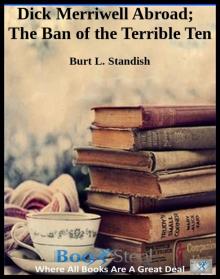 Dick Merriwell Abroad; Or, The Ban of the Terrible Ten
Dick Merriwell Abroad; Or, The Ban of the Terrible Ten Wild Adventures round the Pole
Wild Adventures round the Pole Storm-Bound; or, A Vacation Among the Snow Drifts
Storm-Bound; or, A Vacation Among the Snow Drifts In the Yellow Sea
In the Yellow Sea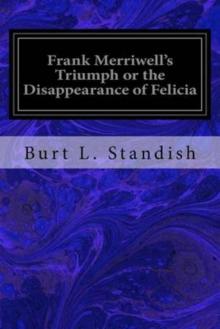 Frank Merriwell's Triumph; Or, The Disappearance of Felicia
Frank Merriwell's Triumph; Or, The Disappearance of Felicia Treasure of Kings
Treasure of Kings Bert Wilson's Twin Cylinder Racer
Bert Wilson's Twin Cylinder Racer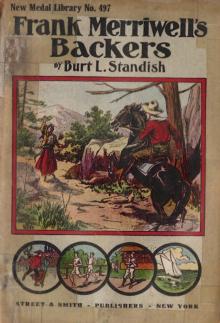 Frank Merriwell's Backers; Or, The Pride of His Friends
Frank Merriwell's Backers; Or, The Pride of His Friends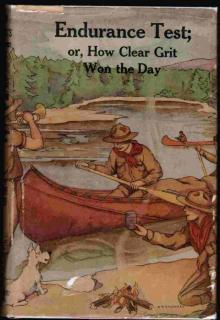 Endurance Test; or, How Clear Grit Won the Day
Endurance Test; or, How Clear Grit Won the Day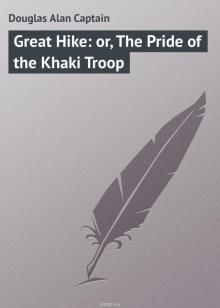 Great Hike; or, The Pride of the Khaki Troop
Great Hike; or, The Pride of the Khaki Troop The Swan and Her Crew
The Swan and Her Crew A cup of sweets, that can never cloy: or, delightful tales for good children
A cup of sweets, that can never cloy: or, delightful tales for good children Frank Merriwell's Bravery
Frank Merriwell's Bravery Frank Merriwell Down South
Frank Merriwell Down South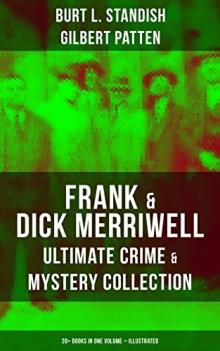 Dick Merriwell's Trap; Or, The Chap Who Bungled
Dick Merriwell's Trap; Or, The Chap Who Bungled The Trail of the Seneca
The Trail of the Seneca Wild Life in the Land of the Giants: A Tale of Two Brothers
Wild Life in the Land of the Giants: A Tale of Two Brothers From Squire to Squatter: A Tale of the Old Land and the New
From Squire to Squatter: A Tale of the Old Land and the New The Cruise of the Snowbird: A Story of Arctic Adventure
The Cruise of the Snowbird: A Story of Arctic Adventure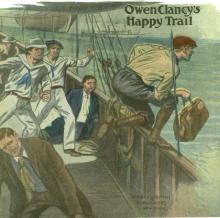 Owen Clancy's Happy Trail; Or, The Motor Wizard in California
Owen Clancy's Happy Trail; Or, The Motor Wizard in California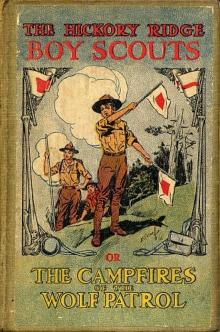 Boy Scouts: Tenderfoot Squad; or, Camping at Raccoon Lodge
Boy Scouts: Tenderfoot Squad; or, Camping at Raccoon Lodge Sing a Song of Sixpence
Sing a Song of Sixpence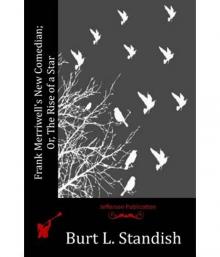 Frank Merriwell's New Comedian; Or, The Rise of a Star
Frank Merriwell's New Comedian; Or, The Rise of a Star The Sa'-Zada Tales
The Sa'-Zada Tales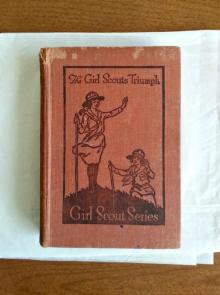 The Girl Scout's Triumph; or, Rosanna's Sacrifice
The Girl Scout's Triumph; or, Rosanna's Sacrifice Wild Adventures in Wild Places
Wild Adventures in Wild Places Fairies I Have Met
Fairies I Have Met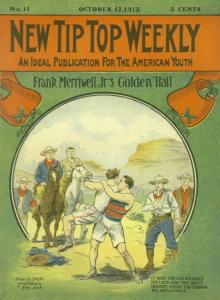 Frank Merriwell's Son; Or, A Chip Off the Old Block
Frank Merriwell's Son; Or, A Chip Off the Old Block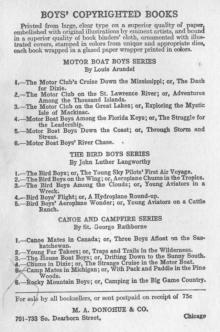 Motor Boat Boys' River Chase; or, Six Chums Afloat and Ashore
Motor Boat Boys' River Chase; or, Six Chums Afloat and Ashore Frank Merriwell's Athletes; Or, The Boys Who Won
Frank Merriwell's Athletes; Or, The Boys Who Won Bart Keene's Hunting Days; or, The Darewell Chums in a Winter Camp
Bart Keene's Hunting Days; or, The Darewell Chums in a Winter Camp Captain June
Captain June